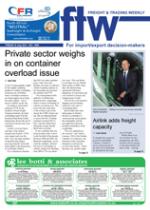Public Private Partnerships
(PPP) are crucial for the
refurbishment of African
railway networks but it
means establishing legal
norms and ensuring projects
are viable in the long run.
Jason Nagy, Africa
business development
manager with the US
development agency USTDA,
said one of the major
drawbacks in Africa was the
unwillingness of parastatals
and project developers to
make early investments in
their planned projects.
“We tend to see an allor-
nothing approach in
Africa where there are many
opportunities. As an agency
we see the potential of
improving logistics, getting
branch lines concessioned,
developing inland ports and
creating corridors to and
from the big ports. There are
definite economic cases for
these projects, but it starts
with the developer who has to
do the legwork.”
Along with that, if Africa
wants to see support from
the private sector coming
in it must create a level of
confidence for investors and
that means ensuring there are
legal norms in place.
“Very often the economic
analysis speaks for itself with
a project, but often we run
into problems in the carrying
out of these projects when it
comes to the legal aspect.”
According to transport
economist George Negota, it
is often because governments
and investors don’t have the
same objectives in these
projects.
“They don’t share a
common initiative as
government wants to see
services provided to its
people while being in total
control of the game, while
the private sector wants to
make money. Obviously you
need to reconcile the two and
PPPs are probably the best
solution.”
Jack van der Merwe, CEO
of the Gautrain Management
Agency, said having the
finances for a project was
extremely important.
“In 2006 I accompanied
then Gauteng premier Tokyo
Sexwale to Germany where
he told the Germans he
wanted to buy a train. When
they asked him where the
money was and he said we
were still looking for it, they
lost interest.”
Some 86% of Gautrain
was funded by government
contributions with the private
sector only contributing
about R3.2 billion in total.
Van der Merwe said it
was important to have a
transparent process that
ensured trust between all
parties involved.
PPPs the way to go for rail infrastructure
08 Jul 2011 - by Liesl Venter
0 Comments
FTW - 8 Jul 11

08 Jul 2011
08 Jul 2011
08 Jul 2011
08 Jul 2011
Border Beat
Featured Jobs
New
New
New
